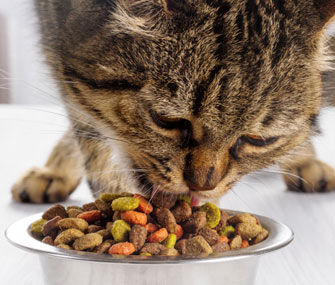Understanding Nutrition Basics for Senior Cats
Published on May 07, 2012
Skip To

Although some cats entering old age may need to watch their waistlines, cats who are even older may have a hard time keeping weight on. Some older cats, mostly those over the age of 12, stop gaining weight and start losing weight, actually requiring more calories. Studies show that most cats over the age of 12 have a decreased ability to digest fat, and about 20 percent of cats over age 12 have a decreased ability to digest protein. Older cats, especially if underweight, can benefit from a diet with increased levels of high-quality protein and fat. Although some age-related problems respond favorably to increased fiber intake, feeding high-fiber foods is not recommended across the board for all senior cats, in part because fiber may decrease the absorption of some essential nutrients.
Older cats often don’t drink enough water. Especially if the cat has impaired kidney function, as some older cats do, this can lead to dehydration. Offering wet food and placing additional bowls of fresh water throughout the house may help increase your cat’s water intake.
Cats are very sensitive to oral pain, and dental problems can make chewing painful, causing a cat to swallow food whole or avoid eating altogether. If your cat seems interested in food but does not eat, he could have oral pain. Be sure to schedule regular wellness visits for your aging feline. Wellness visits include a physical examination and a brief examination of your cat’s teeth and gums (a full dental examination requires sedation). Depending on the findings, your veterinarian may recommend a professional dental cleaning to address your cat’s dental issues. Dry foods designed for tartar removal may improve oral health if the situation is not advanced, but for some older cats, wet food or softer kibble is needed.
Some older cats have decreased senses of taste and smell. If that’s the case with your cat, you will need to feed him particularly aromatic foods. Warming food slightly will cause its aroma to increase, which will often appeal to older cats. Just be sure to avoid overheating the food, and always check to be sure it isn’t too hot before offering it to your cat. Some cats eat better if they are petted while eating. Some also do better with several small meals a day.
The nutritional needs of older cats are influenced by any health problems they may have, many of which — such as kidney failure, diabetes mellitus and heart disease — are more common in older cats and often benefit from special dietary modifications. It’s essential to monitor your cat’s eating, since lack of appetite is one of the more common signs of disease. However, a good appetite does not rule out disease, because certain conditions (such as hyperthyroidism, diabetes mellitus, malnutrition from malabsorption or maldigestion, parasites, and exocrine pancreatic insufficiency, among others) may result in normal or increased appetite.
Your veterinarian is the best person to talk to about your older cat’s individual diet needs. But for most healthy older cats, a commercial senior diet, or sometimes even a diet formulated for adult cats, will be fine. Diets developed especially for senior cats often have increased digestibility to offset weight loss and decreased absorption of nutrients; increased antioxidants to help boost a weakening immune system; and increased palatability and softer kibble.
It’s sometimes a challenge to keep your older cat eating what you want him to, and you may have to make compromises. Talk to your veterinarian if your cat has changes in appetite or weight. Every cat, and every situation, is different.
More from Vetstreet:





